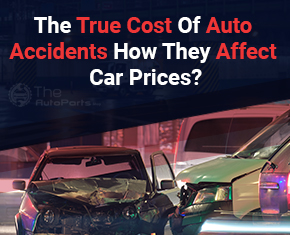Car accidents are at best inconvenient and painful. They may cause you to be late for work or an appointment, take away your car, or raise your insurance rates. In the worst instance, they may result in anyone becoming hurt or perhaps dying.

The National Highway Traffic Safety Administration estimates that the annual cost of vehicle accidents in the United States reaches a maximum of $836 billion. According to the Centre for Disease Control and Prevention, the overall cost of fatalities caused by auto accidents in Texas in 2013 was $4.89 billion, including medical expenses and financial damages. However, the expense of a car collision goes beyond simply restoring a broken down automobile. There are a tonne of expenses associated with accidents that are frequently disguised.
Vehicle Repair and Car Rental
Car crashes can be challenging to avoid. Who pays for what and when depends on several aspects, including who was at fault, if you both have insurance, what kind of insurance you have, and the age of your automobile. The ideal situation would be for one of your insurers to pay for the repair of the car and other associated costs, but if one or both of you don’t have comprehensive collision coverage, you can end up paying more out of your pocket. If you file a claim with your insurance, you will at the very least be required to pay the deductible even if you have comprehensive collision coverage.
You could need a rental car to travel to work, go to doctor’s appointments, and do other daily errands depending on how long the car will be in the shop. A daily rental car fee of $20 to $40 is possible. You could also have to pay for this out of pocket.
You need to consider replacing your car if it is totally totaled. The amount of money you will receive from the insurance provider, whether you have a loan to repay, and the amount you can afford to spend on a new or used automobile should all be taken into account. What type of replacement automobile you can acquire will depend on all of these things.
Medical Care
Costs can quickly mount if you or one or more of your passengers are hurt in an auto accident and require emergency medical care. The list may go indefinitely and include things like an ambulance trip, an ER visit, admission to the hospital, surgery, an overnight stay, medications, and follow-up visits.
Furthermore, even minor accidents can leave drivers and passengers with whiplash and sore bodies. To feel better, you might need to make appointments with a massage therapist, chiropractor, or physical therapist. These visits are often paid for entirely out of pocket.
Lost Wages
Another significant expense for persons involved in auto accidents might be the lack of paid time off from work for personal or sick days. Due to the accident itself, hospitalization, court appearances, meetings with personal injury attorneys, or travel to subsequent medical visits, you can miss work. Loss of income might make it difficult to replace a car, pay for necessities, and pay household obligations.
Insurance Premiums
A recent research found that filing just one claim on your auto insurance might result in a 41% average premium hike. This kind of rise may make owning a car prohibitively expensive and put pressure on other crucial areas of your budget. In some circumstances, if the accident was not your fault, your rates shouldn’t change.
Drive Safely
All drivers may contribute by following a few simple precautions to protect their own safety, the safety of their passengers, and the safety of other road users:
1. Don’t text or chat on the phone while driving.
2. Drive safely after consuming alcohol.
3. Maintain both hands on the wheel.
4. Always buckle up in a car.
5. Make sure kids are in the appropriate booster or car seat for the size and age.
6. Observe speed restrictions and traffic lights.
7. Consider what other motorists would do.
8. Create an emergency fund to aid with unforeseen costs like auto repairs or accidents.
Wrapping It Up
Thousands of unnecessary fatalities and injuries might be avoided, and billions of dollars could be saved if drivers would only quit drinking and driving, pay attention to the roads, and follow the speed limit. To recover damages for their losses, those hurt in crashes brought on by negligent drivers or the family members of those deceased must file a lawsuit.
